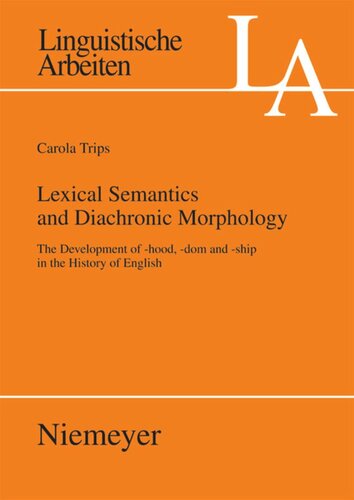

Most ebook files are in PDF format, so you can easily read them using various software such as Foxit Reader or directly on the Google Chrome browser.
Some ebook files are released by publishers in other formats such as .awz, .mobi, .epub, .fb2, etc. You may need to install specific software to read these formats on mobile/PC, such as Calibre.
Please read the tutorial at this link: https://ebookbell.com/faq
We offer FREE conversion to the popular formats you request; however, this may take some time. Therefore, right after payment, please email us, and we will try to provide the service as quickly as possible.
For some exceptional file formats or broken links (if any), please refrain from opening any disputes. Instead, email us first, and we will try to assist within a maximum of 6 hours.
EbookBell Team

4.7
86 reviewsThis book is the most comprehensive study to date of the development of the three suffixes -hood, -dom and -ship in the history of English. Based on data from annotated corpora it provides an in depth investigation from Old English to Modern English and shows that structurally the three suffixes developed from syntactic heads (nouns) via morphological heads in compounds to morphological heads in derivations. Being an instance of morphologisation the rise of suffixes clearly shows that word formation is not part of the syntactic module. This development is triggered by semantic change, more precisely, by the semantics of the elements which keep their salient meanings and develop further meanings through metonymic shifts, finally leading to underspecified meanings. The findings are analysed in a revised version of Lieber's (2004) framework to account for the diachronic facts and have far-reaching consequences for morphological theory since they show that derivational suffixes bear meaning and hence contribute to processes of lexicalisation which is clear evidence for sign-based models and against, for example, Separationist assumptions.